12 Things You Should Never Put Down the Drain—Even if You Have a Garbage Disposal
You might be surprised to learn which items can clog or damage your pipes.
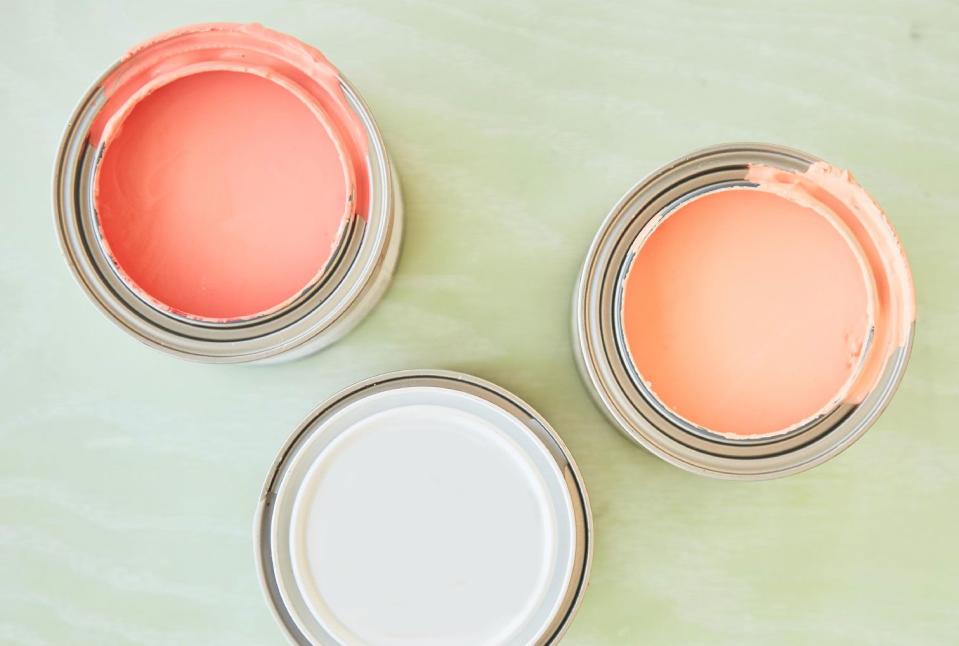
Janelle Jones
Removing a clog from your pipes is not only extremely inconvenient, but it can also be messy and expensive. You can't always prevent your pipes from getting clogged, but there are some things you can do, starting with what you pour down the drain.
"It's important to understand that your drainpipes are designed to handle fluids and debris from your toilet, dishwasher, and washing machine," says Hendrik Vandepoll, co-owner and master plumber of Service Force Plumbing. "Don’t ask them to do more than that. When it comes to your sink, very, very little should go down the drain, even if you send it through the garbage disposal."
Besides the damage to your plumbing system, pouring certain things like medications or bleach down the drain can release chemicals into your local water supply, harming the local ecosystem. We spoke to plumbing experts to learn which things you should avoid pouring down the drain to keep your plumbing system in good working order.
Meet Our Expert
Josh Mitchell, plumbing technician with Plumbing Lab
Roy Barnes and Hendrik Vandepoll, co-owners of Service Force Plumbing
Mehdi Khachani, CEO, JMK Plumbing
Related: The Right Way to Clean a Kitchen Sink, From Stainless Steel to Copper
Coffee Grounds
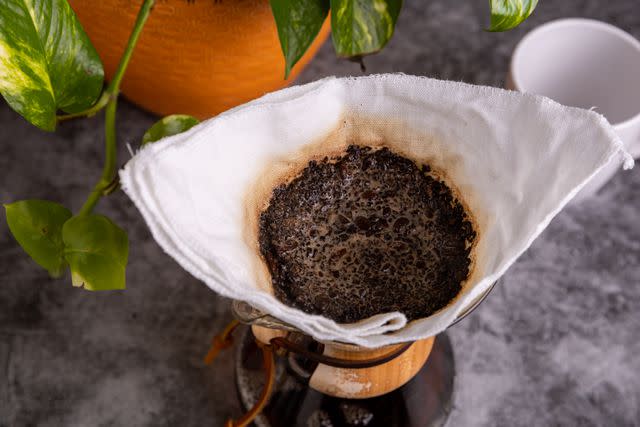
Zacary Capps / Getty Images
A common act in the morning is to dump the previous day's coffee grounds in the sink, but start shifting to the garbage (or compost) instead. "They might seem harmless, but coffee grounds can accumulate in pipes, acting similarly to sediment and causing blockages," says Josh Mitchell, plumbing technician with Plumbing Lab. "Over time, this can necessitate costly plumbing repairs."
Related: A Beginner's Guide to Composting—Plus, How to DIY a Compost Bin
Eggshells
Compost those eggshells! Tossing them down your garbage disposal and drain is a recipe for a blockage. "Ground-up eggshells create granular waste that can combine with other substances, such as grease, to create blockages in your plumbing system," Mitchell says.
Grease and Oil
Grease and oil might look harmless, but grease has the potential to congeal and harden, while leftover oil can coat your pipes and cause other things to get stuck. "The biggest no-no is grease, for sure," says Vandepoll. "Grease will cool quickly in dark, hidden pipes and become a sticky mess that can either create a blockage on its own or grab other debris as it passes through."
Vanderpoll's partner, Roy Barnes, agrees, noting that even though oil doesn't congeal, it's still a cause for concern. "Oil is a problem, too. It doesn't congeal like grease, but they still coat the inside of pipes and get sticky over time, increasing the likelihood of other debris getting stuck and causing a clog," says Barnes. "Some oil down the drain is unavoidable, of course, as you wash dishes, but you shouldn't be pouring leftover oil down the drain."
An easy way to remedy this is to designate an old can or another container (avoid plastic as it can melt) for leftover grease and cooking oil. Let it cool and harden, and then toss it. "Some towns and cities even offer free caps that fit on soup cans so you can collect grease, cool it down, and put it right in the trash, can and all," says Vandepoll.
Rice and Pasta
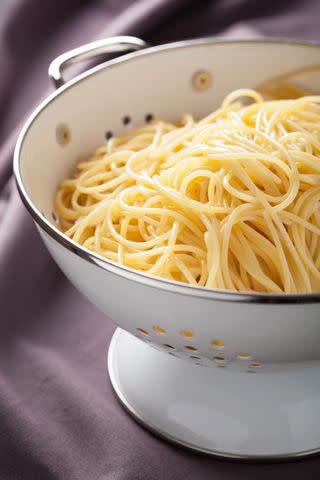
OlgaMiltsova / Getty Images
You know how when you cook rice and pasta in water, it swells? Well, the same thing happens when you pour it down the drain and flush it with water. "These foods expand when exposed to water, even after they've been cooked," Mitchell says. "Pouring them down the drain can cause them to swell and potentially block pipes, leading to backups and the need for professional intervention."
Related: The Right Way to Clean Your Garbage Disposal—and Keep the Drain Fresh
Fibrous Foods
Foods like celery and onion skins should skip the garbage disposal and be composted or tossed instead. "Celery, onion skins, and other fibrous vegetables can wrap around the blades of your garbage disposal, leading to mechanical issues," says Mehdi Khachani, CEO of JMK Plumbing. Then, once these make it past your garbage disposal, the strands from these vegetables can become another clogging risk.
Medication
While medication won't cause a clog in your pipes, pouring it down the drain can contaminate your local watershed, harming your local aquatic life. "It's crucial to dispose of medication through proper channels, such as pharmacy take-back programs," says Mitchell.
Paint
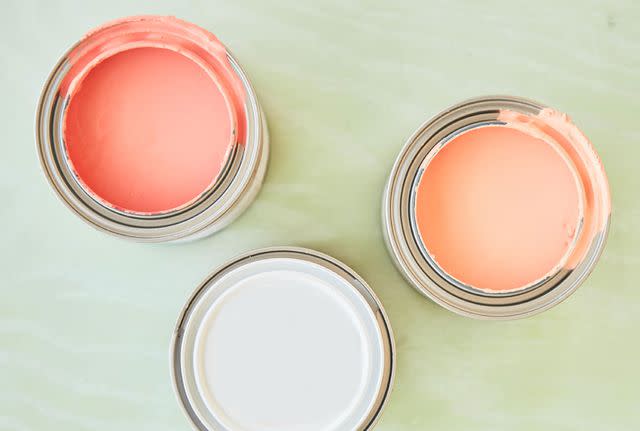
Janelle Jones
Leftover paint is considered a hazardous waste material, and should never be poured down the drain. Doing so can both damage your plumbing system and introduce harmful chemicals into waterways. "Always follow local guidelines for the disposal of hazardous materials," says Mitchell. This may include disposing of leftover paint at a hazardous waste facility (especially if it's an oil-based paint or epoxy), or taking leftover paint to a paint recycling center at your local waste management facility. If you're disposing of acrylic or latex-based paint, it's usually acceptable to throw it in the trash only after it's been dried out completely, either by leaving it in the sun or mixing it with kitty litter.
Produce Stickers
Those little produce stickers that you find on apples and bananas look fairly harmless, but sending too many down the drain (either on purpose or accidentally) can create a blockage. "These small items can stick to pipes and join with other debris to create clogs," says Mitchell. "Additionally, they can cause problems at water treatment facilities."
Related: How to Unclog a Drain With Baking Soda and Vinegar
Bones and Fruit Pits
Your garbage disposal and, therefore, your pipes are not meant for very hard things like bones and fruit pits. These can damage or break your garbage disposal, making for potentially costly repairs.
Potato Peels
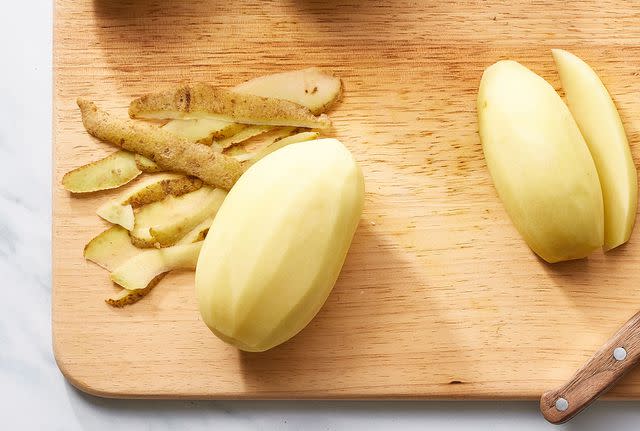
Brie Goldman
Potatoes are a very starchy food, and when potato peels meet water after a churn through a garbage disposal, they can create a sticky paste that can contribute to clogs in your pipes. "The day after Thanksgiving is one of the busiest plumbing crisis days of the year, partly due to all the potato scraps and peels being sent down the drain," says Barnes. "Starches grind up into a sticky paste in the garbage disposal and will clog up your drain in no time, either all by itself or by grabbing other debris going through the drainpipe."
Related: 4 DIY Drain Cleaner Recipes That Use Natural Ingredients to Prevent Clogs
Bleach
It's never a good idea to pour bleach down your drain—bleach is highly corrosive and can eat away at your pipes. It can also chemically react with any food scraps down there, or other cleaners and create dangerous chemical compounds like chloroform. If you need to dispose of bleach, take it to a hazardous waste facility.
Related: The Right Way to Clean With Bleach in Your Home
Honey
Honey is super sticky—a good property to have for causing clogs and blockages down in your pipes. Honey can also harden and crystalize, leading to more potential problems.
Read the original article on Martha Stewart.

